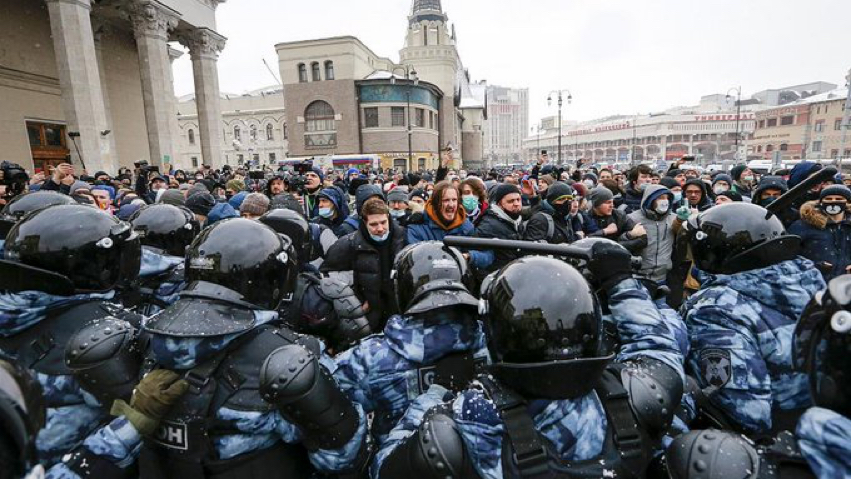Russia Protests Target Putin and Systemic Issues
Protests in Russia in support of Alexei Navalny, Putin critic and opposition leader, are in response to more than his unlawful arrest. They are an expression of Russian citizens who are angry with their government’s unethical operations. These protests are justifiable due to decades of policing and silencing public opinion.
For the past two weeks, protests have been erupting across Russia in support of Navalny after he was detained by President Vladimir Putin. Navalny has consistently been a vocal critic of Putin and has a large following primarily consisting of young people.
In August 2020, Navalny was poisoned with a nerve agent and was hospitalized after falling ill. Two days later, Navalny was transferred to a hospital in Berlin, Germany. Miraculously, he made a full recovery after being in a coma for two weeks and was discharged from the hospital in late September. On Jan. 17, 2021, Navalny returned to Russia after spending five months recovering from the poison attack. Within moments of his return to Moscow, Navalny was detained by the Kremlin. According to the Russian government, the arrest was warranted because Navalny was on the country’s federal wanted list for violating terms of probation, which he believes is a politically motivated charge. Navalny’s return to Russia was brave and serves as a symbol for others who disagree with Putin.
Navalny’s arrest provoked thousands of people to take their fury to the streets of cities all over the country. Around 5,100 people have been arrested, and many accounts claim the police have used violent force against some protestors. While Navalny’s arrest was the main reason for protesting, there were also other motives for why people participated in the protests.
Unemployment is at its highest since 2012. Additionally, the gap between the rich and poor has increased substantially. Russia was hit severely by the COVID-19 pandemic, which resulted in the economy suffering to a great extent. Many people felt the government did not aid them enough during such a dire situation. As for direct protest against Putin, many Russian citizens are angered at a referendum that passed in July 2020. This referendum allows for Putin to stay active in power until 2036, and it also includes amendments like a ban on same-sex marriage.
Navalny is simply an example to the Russian people: If one person gets silenced by the government for voicing their opinion, what is stopping the government from silencing everyone? A Time Magazine interview with a woman participating in the protests for the first time stated: “I realized that something is wrong with our country. If Navalny could become a victim for speaking openly, I could become one too.” These protests go far beyond Navalny and highlight the many angry people who are tired of Putin’s regime and fear losing their right to freedom of speech.
The greater theme of why people are protesting is similar to those of protests around the world. There is a parallel to the protests occurring in the United States, specifically during June 2020 and throughout the summer. In response to the murder of George Floyd, Black Lives Matter protests began surging in cities but also sparked small communities to protest as well. While the protests were sparked by the murder of George Floyd, the goal of the protest was to challenge systemic racism and police brutality. A majority of protestors are young adults, similar to the protests now occurring in Russia. These young “free thinkers” may challenge systems or policies that have been in place for ages, and for Russia, a leader that has been in power since 1999, with constitutional interruptions during 2008-2012. The protests are also comparable in that both were heavily policed and controlled, with protestors injured by the police, even though both freedom of speech and protest are guaranteed rights in both countries.
Something extremely important and fascinating is unraveling in these protests all over Russia. More and more people are protesting not just for Navalny, but for the ability to voice their own opinions about Putin and the Russian government. What happens from here? We can hope that Putin and the Russian government listen to the people for once and realize how many people are unhappy with their government. Without significant changes, one can assume that Putin will keep gaining more and more critics for silencing the people he reigns over.
Ally Dugan, FCRH ’23, is a communications and culture major from West Chester, Penn.








































































































































































































